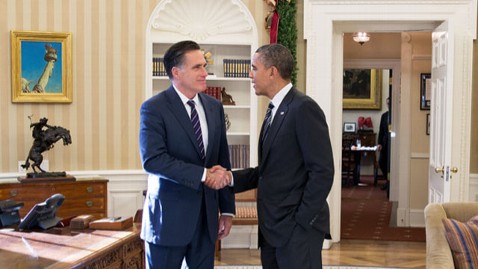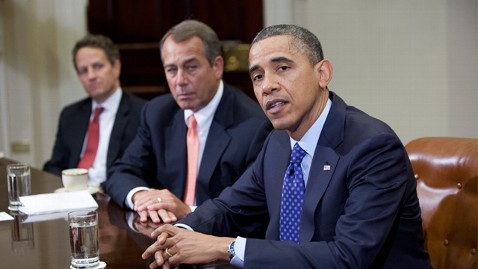
Pete Souza/White House
The 2012 election cycle came full circle last week when representatives from the Obama and Romney campaigns, as well as top advisers to many of the GOP primary candidates and several influential outside groups, gathered at the Harvard Kennedy School of Government for a 2012 debrief — finally answering some of the lingering questions about the race.
On neutral ground in Cambridge, Mass., fierce rivals (think Romney campaign manager Matt Rhoades and strategist Stuart Stevens and Obama campaign manager Jim Messina and strategist David Axelrod) met for the first time since the election — and many for the first time ever.
The conference, organized by Harvard’s Institute of Politics, featured a who’s who of political bold-faced names from campaign 2012, including senior campaign aides like Romney political director Rich Beeson and pollster Neil Newhouse, Obama deputy campaign manager Stephanie Cutter and digital director Teddy Goff, Rick Santorum adviser John Brabender, former Rick Perry campaign operatives Rob Johnson and Dave Carney and even Mark Block, who ran Herman Cain’s short-lived but much-talked-about presidential bid.
Representatives from the outside groups that had so much influence — and spent so much money — on the election were also on hand, including Bill Burton, senior strategist for the pro-Obama super PAC, Priorities USA Action; Steven Law, head of the pro-Republican group American Crossroads; and Tim Phillips, president of the conservative Americans for Prosperity.
Dozens of campaign 2012 veterans and journalists were on hand for the sessions, which covered the GOP primary, the general election, campaign strategy, the debates, conventions and the emerging power of the super PACS.
Here are some of the highlights from the conference:
Romney’s Campaign Concedes Immigration Position in Primary Was a Mistake
Mitt Romney’s decision to take a hard-line stance on immigration during the GOP primary was considered a big reason for his paltry 27 percent showing among Latino voters. But, the conventional wisdom has suggested that Romney couldn’t have won the primary without drawing a strong contrast with Texas Gov. Rick Perry on this hot-button issue.
Romney campaign manager Matt Rhodes, however, says that his candidate could have won the primary without attacking Perry’s support for in-state tuition for illegal immigrants. When asked by panel moderator Jonathan Martin of Politico whether he “regret[s] trying to outflank Perry on the right on immigration,” Rhoades took a long pause, and then shifted the conversation to Perry’s controversial statements about Social Security. Romney had attacked the Texas governor for calling the popular entitlement program a “Ponzi scheme” and a “failure.”
“In retrospect,” Rhoades said. “I believe we probably could have just beaten Perry with the Social Security hit.”
So while Rhoades never said he wished that Romney had never uttered the words, “self-deportation” he essentially conceded that he regrets the immigration position the governor took in the primary.
The Obama Campaign Only Fully Committed to Florida in Mid-September
If there was one state that the Romney campaign felt confident they were going to win it was Florida. And, until mid-September, the Obama campaign wasn’t convinced that they were going to contest the state. That changed in the aftermath of the strong convention in Charlotte, however, and the Obama campaign decided that they were going to go “full out” to win there.
Obama campaign strategist David Axelrod:
“One of the things that we had discussed internally was the state of Florida and how we were going to treat Florida. We had made a decision that we were going to wait until mid September and after the conventions to see where we were in Florida before we fully committed. We were in, we had invested a lot, but we hadn’t been in the Miami media market. When we emerged from conventions not only had we gotten a little bump, but we saw Florida remained very competitive and made the decision to go full out in Florida.”
Team Romney Never Read Clint Eastwood Speech
Romney strategist and convention director Russ Schrieffer was asked by panel moderator Ron Brownstein of National Journal if anyone actually read a copy of Eastwood’s speech. The answer: not so much.
Russ Schrieffer: “I said [to Eastwood] are you going to do what we talked about, are you going to talk about what you talked about at these fundraisers. And he looked at me and said.. ‘Yep.’ ”
Laughter followed Schrieffer’s comments to which he replied:
“It’s Clint Eastwood, you argue with him.”
Republicans Are Worried (And Rightly So) About the Technology Gap With Democrats:
Jon Huntsman’s campaign manager Matt David noted that “one area we should freak out about is technology. The GOP is far behind there.”
The Obama campaign used social media as a means to an end — using technology as a way to recruit, persuade, target and turn out voters. Obama’s digital campaign guru Teddy Goff pointed to the power of Facebook in helping to find a previously unreachable group of potential voters: the friends of those who were already voting for the President.
In 2008, said Goff, they found that “99 percent of our email list voted.” As such, Goff said, “We entered into this election, with an understanding that anyone we were talking to directly, the vast majority were voting for us. So the question was … how can we serve them with stuff that will make them go out and get their friends.” And, Obama’s Facebook fans were a great place to start. Obama’s 33 million Facebook fans globally are friends with 98 percent of the U.S. Facebook population, Goff said.
Facebook also helped the campaign track down their coveted 18-to-29-year-old cohort. Goff explained that they were unable to reach half of their 18-to-29 GOTV targets by phone because they didn’t have a phone number for them. But, he said, they could reach 85 percent of that group via a Friend of Barack Obama on Facebook. “We had an ability to reach those people who simply otherwise couldn’t be reached,” Goff said.
Was the Romney High Command Really and Truly Shocked on Election Night?
Neil Newhouse, Romney pollster:
“Here’s what we saw in the data: you have to give credit to the Obama campaign for undercutting it. We saw in the last two weeks, an intensity advantage, a campaign interest advantage, an enthusiasm advantage for Republicans and Mitt Romney. … Just the same as we saw four years ago on behalf of Barack Obama. We thought it would tilt the partisan make-up of the electorate a couple points in our direction.
“We weren’t surprised by racial composition; we were surprised by the partisan composition. … The real hidden story here on our side, the number of white men who didn’t vote in this election compared to four years ago was extraordinary. And these white men were replaced by white women. We were taking a group we won by 27 points and replacing them with a group we won by 12-14 points.”
Perry Should Have Waited Until Late Fall, Not Summer, to Jump In:
Perry strategist Dave Carney said the biggest tactical mistake made by Perry was that “we should have started years ago.” Perry, as governor in a state with a part-time legislature, “had a lot of time on his hands” — he should have used that time, and his role as RGA chair, to meet donors and travel the country before 2011. Once Perry decided to get in, however, Carney argues the Perry should have waited until mid-October or November to get into the race. That extra few months, said Carney, “would have given us more time to be prepared and do the groundwork that was necessary on the issues.”
What Role Did Karl Rove Play With Republican Outside Groups Like American Crossroads, Which He Co-founded?
Steven Law, president and CEO of American Crossroads and president CrossroadsGPS:
“Karl … recognized it was really important to not simply have an organization exist in a particular cycle for a tactical use but to … start to build enduring institutional strength on the right the way that we saw the unions providing that for the Democrats. … And then there were certain other parts that I think Karl really gets credit for. The first is encouraging us to reach out to other center-right groups and to try to start to collaborate where we were legally permitted to do so to share information and encourage people to pull the oars in the same direction. On the fundraising side both he and Ed [Gillespie] and then later on Haley Barbour were all tremendously instrumental in harvesting their Rolodexes and relationships. Karl is a guy that’s got tremendously good ideas, and again, not so much on the tactical side but more kind of broad strategic moments and was a tremendously useful and valuable source of ideas along the way.”
Bill Burton, senior adviser, Priorities USA Action:
“He also helped us raise money. I probably e-mailed out every one of his columns to our donors — our high-dollar list — to point out what they were saying on the Republican side and how confident Rove was. … When he would go on TV bursting with confidence about Romney winning, that little click went around every single time. Karl Rove is an enduring figure for both sides.”
After Rove’s Appearance on Fox News on Election Night, Is He Discredited Within the Republican Party?
Steven Law:
“Absolutely not. We all get our turn in the barrel.”


























